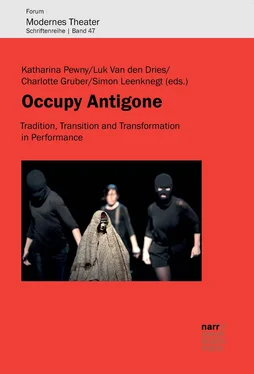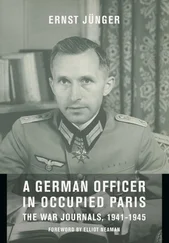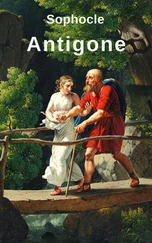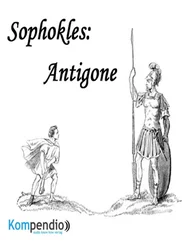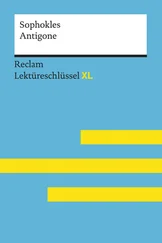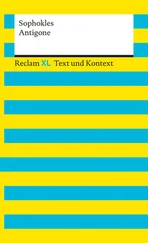53). The article “Beyond Kinship: From Antigone to ANT” by Mateusz Borowski and Małgorzata Sugiera closes the section on “Antigone’s Transformed Heritage”. They reveal the transformation the concept of kinship has undergone in both philosophy and psychoanalysis. Starting from Judith Butler’s Antigone’s Claim,they investigate her claim that “stable kinship norms support our abiding sense of culture’s intelligibility”25 within popular culture. Through original case studies such as the science fiction film Splice(Vincenzo Natali, 2009), the film Stoker(Park Chan-Wook, 2013) and the TV series Game of Thrones(2011-present) they shed new light on the traditional Oedipal scenario that Freud read in Sophocles’ Antigone. With an innovative theoretical twist in their analysis, they extend Butler’s ideas by means of the Actor-Network Theory that Bruno Latour develops in Reassembling the Socialas a “circulating entity that is no longer composed of the stale assemblage of what passed earlier as being part of society”.26 They deploy Latour’s theory to open up a path that goes beyond the philosophy of causality. Performativity is defined as something that is constantly being made and remade. The second section, “Antigone’s Mechanisms of Exclusion and Resistance”, addresses the appropriation of Antigoneas a canonical text of Western heritage against the critical background of postcolonial theory, with two contributions turning their attention to the African context, which has frequently been the subject of analysis.27 The readings of Antigoneand related performances that are addressed in the second section deal with the legacy of domination of Western thought and the repression of cultural diversity and difference, while showing the relevance of an independent cultural heritage to form and nurture an independent cultural identity. However, the manifest focus on the few exemplary popular performances (of which Femi Òsófisan’s Tègònniis one) in the second section and in many other publications in the English-speaking performance studies also reflects that the access to – and consideration of – non-Western performances remains restricted and problematic. Tina Chanter has recently edited the anthology The Returns of Antigone28 and is author of the critical analysis of Sophocles’ original entitled Whose Antigone? The Tragic Marginalization of Slavery(2011).29 The publication received acclaim for the fact that Chanter traces Antigone’s influence on Western thought to reveal and problematize how the marginalization of the position of slaves, which is crucially inherent in the tragedy and was so fundamental to the society of the Attic polis, has been gone more or less unnoticed for more than five centuries. In her contribution “The Returns of Antigone and the Remains of Antigone: to Bury or not to Bury”, she unfolds this argument anew and shows “how [Antigone’s] efforts to inscribe her burial of her brother as meaningful, legitimate, and intelligible underwrite the marginalization of others” (p. 81). With the subsequent articles by Wumi Raji and Izuu Nwankwo, two African scholars provide their view regarding the production by Femi Òsófisan. In “Between Antigoneand Tègònni: Tragic Visions and Translations”, Raji draws from Sophocles’ original as well as Òsófisan’s performance to “undertake a comparative exploration of the formal and visionary continuities and transformations between these two related tragedies” (pp. 94–95). He does so by “[f]ocusing specifically on the private theme of inter-racial love” (p. 95). While Raji links the Greek tragedy to the African adaptation, Nwankwo starts from Òsófisan’s Tègònnito make comparisons with the illustrated translation Antigonickby Anne Carson and Bianca Stone.30 In his paper “Antigone, Tègònni and Antigonick: Performing Resistance in a Glocalised Society”, Nwankwo uses Derrida’s concept of différanceto look “to other characters who surround Antigone to determine how their (in)actions shape hers” (p. 108). The shift towards a more careful consideration of the other characters in Antigoneis a trend that can be seen in both performance practice (e.g. Lot Vekeman’s Zus Van, 2005) and philosophical theory (e.g. the focus on the neglected role of Ismene in Bonnie Honig’s Antigone Interrupted).31 In her contribution “The Other Antigone(s): Performing Deconstructed Legacies”, Charlotte Gruber, who also engages with theoretical concepts by Derrida, addresses this shift towards the Other and its relevance for introducing a critical distance from Eurocentrism and logocentrism in two recent European theatre productions, namely Zus Vanby Lot Vekemans (Belgium, 2005) and Antigoneby Nicole Beutler and Ulrike Quade (The Netherlands, 2012). The articles that constitute the last section revolve around “Antigone’s Scenes of Death”. While in Hegel’s account the ritual and religious aspects of the burial performed by Antigone stood central, today Antigone often comes to represent the radical politicality of the right to mourn and bury the deceased as a basic human right and as a tool of political power. Especially when contemplating for example Foucault’s work on biopolitics32 and Judith Butler’s reflections on ‘grievable life’,33 questions surrounding the dead and their righteous place become important. In “Not Even His Dead Body: Polyneices, the Excluded Brother”, Francesca Spiegel gives a detailed analysis of the role of Polyneices from a variety of angles, stressing that “[e]ven though Polyneices is not the most important character of Antigone, his life, and the end of his life, is ultimately what provokes all of the arguments, crisis and tragedy of Antigone” (p. 149). She investigates how the group dynamics in the play are influenced by the presence of his corpse and are as much social and political as they are ideological. She points out his neglected position, for even though “[t]he dead Polyneices does not speak in Antigone, […] the presence of his body and of his spirit weigh heavy on the whole character constellation” (p. 149). Małgorzata Budzowska addresses the concept of ‘post-memory’ by Marianne Hirsch in her article “The Political Theatre of Dying in the AntigoneProduction by Marcin Liber”. According to Budzowska, the Polish performance, which premiered at the New Theatre in Łódź in 2013, deals with post-war trauma and connects themes of a global and a local level, as well as public and individual modes of mourning. Her analysis of Liber’s adaptation is the point of departure for critically examining how political engineering influences questions of who and what is worth to be commemorated and how this should be done. The paper “(Un)Dead and (Un)Buried: From Antigone to Chelsea Manning” by Aneta Stojnić, establishes a connection between Antigone and Chelsea Manning by interpreting the figure of the whistleblower as a contemporary Antigone, while also tackling aspects of gender performativity against this background. Citing Jacques Rancière, Judith Butler as well as Arthur Danto, Stojnić presents an exciting case of how contemporary resistance works and fails on various levels. Butler’s theories also play a central role in the joint contribution “Ritual Failure Remains? The Inaccessibility of the Dead (Corpse) in Antigone and in Contemporary Post-Conflict Art” by Katharina Pewny and Inge Arteel. They particularly elaborate on Butler’s work on grievable life and relate it to the concept of ‘ritual failure’, which originated in a context of religious studies and social sciences. Combining approaches from performance studies and literary studies, they analyse the novel Frozen Time(2010) by Anna Kim and the film Élevage de poussière/Dust Breeding(2013) by Sarah Vanagt. In their analyses, they unravel ‘Antigonal’ motives in contemporary art practices and close this anthology by showing that “mourning is not simply a private matter, but also something that constructs political, social and ethical norms” (p.
Читать дальше
